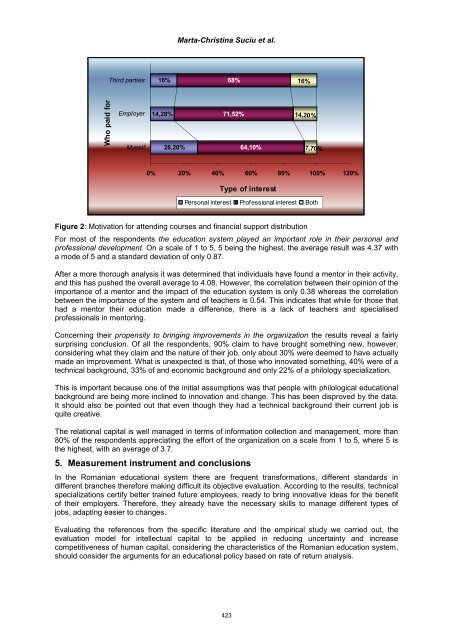Proceedings of the 3rd European Conference on Intellectual Capital
Proceedings of the 3rd European Conference on Intellectual Capital
Proceedings of the 3rd European Conference on Intellectual Capital
Create successful ePaper yourself
Turn your PDF publications into a flip-book with our unique Google optimized e-Paper software.
Who paid for<br />
Third parties<br />
Employer<br />
Myself<br />
16%<br />
14,28%<br />
28,20%<br />
Marta-Christina Suciu et al.<br />
68%<br />
71,52%<br />
64,10%<br />
16%<br />
14,20%<br />
7,70%<br />
0% 20% 40% 60% 80% 100% 120%<br />
Type <str<strong>on</strong>g>of</str<strong>on</strong>g> interest<br />
Pers<strong>on</strong>al interest Pr<str<strong>on</strong>g>of</str<strong>on</strong>g>essi<strong>on</strong>al interest Both<br />
Figure 2: Motivati<strong>on</strong> for attending courses and financial support distributi<strong>on</strong><br />
For most <str<strong>on</strong>g>of</str<strong>on</strong>g> <str<strong>on</strong>g>the</str<strong>on</strong>g> resp<strong>on</strong>dents <str<strong>on</strong>g>the</str<strong>on</strong>g> educati<strong>on</strong> system played an important role in <str<strong>on</strong>g>the</str<strong>on</strong>g>ir pers<strong>on</strong>al and<br />
pr<str<strong>on</strong>g>of</str<strong>on</strong>g>essi<strong>on</strong>al development. On a scale <str<strong>on</strong>g>of</str<strong>on</strong>g> 1 to 5, 5 being <str<strong>on</strong>g>the</str<strong>on</strong>g> highest, <str<strong>on</strong>g>the</str<strong>on</strong>g> average result was 4.37 with<br />
a mode <str<strong>on</strong>g>of</str<strong>on</strong>g> 5 and a standard deviati<strong>on</strong> <str<strong>on</strong>g>of</str<strong>on</strong>g> <strong>on</strong>ly 0.87.<br />
After a more thorough analysis it was determined that individuals have found a mentor in <str<strong>on</strong>g>the</str<strong>on</strong>g>ir activity,<br />
and this has pushed <str<strong>on</strong>g>the</str<strong>on</strong>g> overall average to 4.08. However, <str<strong>on</strong>g>the</str<strong>on</strong>g> correlati<strong>on</strong> between <str<strong>on</strong>g>the</str<strong>on</strong>g>ir opini<strong>on</strong> <str<strong>on</strong>g>of</str<strong>on</strong>g> <str<strong>on</strong>g>the</str<strong>on</strong>g><br />
importance <str<strong>on</strong>g>of</str<strong>on</strong>g> a mentor and <str<strong>on</strong>g>the</str<strong>on</strong>g> impact <str<strong>on</strong>g>of</str<strong>on</strong>g> <str<strong>on</strong>g>the</str<strong>on</strong>g> educati<strong>on</strong> system is <strong>on</strong>ly 0.38 whereas <str<strong>on</strong>g>the</str<strong>on</strong>g> correlati<strong>on</strong><br />
between <str<strong>on</strong>g>the</str<strong>on</strong>g> importance <str<strong>on</strong>g>of</str<strong>on</strong>g> <str<strong>on</strong>g>the</str<strong>on</strong>g> system and <str<strong>on</strong>g>of</str<strong>on</strong>g> teachers is 0.54. This indicates that while for those that<br />
had a mentor <str<strong>on</strong>g>the</str<strong>on</strong>g>ir educati<strong>on</strong> made a difference, <str<strong>on</strong>g>the</str<strong>on</strong>g>re is a lack <str<strong>on</strong>g>of</str<strong>on</strong>g> teachers and specialised<br />
pr<str<strong>on</strong>g>of</str<strong>on</strong>g>essi<strong>on</strong>als in mentoring.<br />
C<strong>on</strong>cerning <str<strong>on</strong>g>the</str<strong>on</strong>g>ir propensity to bringing improvements in <str<strong>on</strong>g>the</str<strong>on</strong>g> organizati<strong>on</strong> <str<strong>on</strong>g>the</str<strong>on</strong>g> results reveal a fairly<br />
surprising c<strong>on</strong>clusi<strong>on</strong>. Of all <str<strong>on</strong>g>the</str<strong>on</strong>g> resp<strong>on</strong>dents, 90% claim to have brought something new, however,<br />
c<strong>on</strong>sidering what <str<strong>on</strong>g>the</str<strong>on</strong>g>y claim and <str<strong>on</strong>g>the</str<strong>on</strong>g> nature <str<strong>on</strong>g>of</str<strong>on</strong>g> <str<strong>on</strong>g>the</str<strong>on</strong>g>ir job, <strong>on</strong>ly about 30% were deemed to have actually<br />
made an improvement. What is unexpected is that, <str<strong>on</strong>g>of</str<strong>on</strong>g> those who innovated something, 40% were <str<strong>on</strong>g>of</str<strong>on</strong>g> a<br />
technical background, 33% <str<strong>on</strong>g>of</str<strong>on</strong>g> and ec<strong>on</strong>omic background and <strong>on</strong>ly 22% <str<strong>on</strong>g>of</str<strong>on</strong>g> a philology specializati<strong>on</strong>.<br />
This is important because <strong>on</strong>e <str<strong>on</strong>g>of</str<strong>on</strong>g> <str<strong>on</strong>g>the</str<strong>on</strong>g> initial assumpti<strong>on</strong>s was that people with philological educati<strong>on</strong>al<br />
background are being more inclined to innovati<strong>on</strong> and change. This has been disproved by <str<strong>on</strong>g>the</str<strong>on</strong>g> data.<br />
It should also be pointed out that even though <str<strong>on</strong>g>the</str<strong>on</strong>g>y had a technical background <str<strong>on</strong>g>the</str<strong>on</strong>g>ir current job is<br />
quite creative.<br />
The relati<strong>on</strong>al capital is well managed in terms <str<strong>on</strong>g>of</str<strong>on</strong>g> informati<strong>on</strong> collecti<strong>on</strong> and management, more than<br />
80% <str<strong>on</strong>g>of</str<strong>on</strong>g> <str<strong>on</strong>g>the</str<strong>on</strong>g> resp<strong>on</strong>dents appreciating <str<strong>on</strong>g>the</str<strong>on</strong>g> effort <str<strong>on</strong>g>of</str<strong>on</strong>g> <str<strong>on</strong>g>the</str<strong>on</strong>g> organizati<strong>on</strong> <strong>on</strong> a scale from 1 to 5, where 5 is<br />
<str<strong>on</strong>g>the</str<strong>on</strong>g> highest, with an average <str<strong>on</strong>g>of</str<strong>on</strong>g> 3.7.<br />
5. Measurement instrument and c<strong>on</strong>clusi<strong>on</strong>s<br />
In <str<strong>on</strong>g>the</str<strong>on</strong>g> Romanian educati<strong>on</strong>al system <str<strong>on</strong>g>the</str<strong>on</strong>g>re are frequent transformati<strong>on</strong>s, different standards in<br />
different branches <str<strong>on</strong>g>the</str<strong>on</strong>g>refore making difficult its objective evaluati<strong>on</strong>. According to <str<strong>on</strong>g>the</str<strong>on</strong>g> results, technical<br />
specializati<strong>on</strong>s certify better trained future employees, ready to bring innovative ideas for <str<strong>on</strong>g>the</str<strong>on</strong>g> benefit<br />
<str<strong>on</strong>g>of</str<strong>on</strong>g> <str<strong>on</strong>g>the</str<strong>on</strong>g>ir employers. Therefore, <str<strong>on</strong>g>the</str<strong>on</strong>g>y already have <str<strong>on</strong>g>the</str<strong>on</strong>g> necessary skills to manage different types <str<strong>on</strong>g>of</str<strong>on</strong>g><br />
jobs, adapting easier to changes.<br />
Evaluating <str<strong>on</strong>g>the</str<strong>on</strong>g> references from <str<strong>on</strong>g>the</str<strong>on</strong>g> specific literature and <str<strong>on</strong>g>the</str<strong>on</strong>g> empirical study we carried out, <str<strong>on</strong>g>the</str<strong>on</strong>g><br />
evaluati<strong>on</strong> model for intellectual capital to be applied in reducing uncertainty and increase<br />
competitiveness <str<strong>on</strong>g>of</str<strong>on</strong>g> human capital, c<strong>on</strong>sidering <str<strong>on</strong>g>the</str<strong>on</strong>g> characteristics <str<strong>on</strong>g>of</str<strong>on</strong>g> <str<strong>on</strong>g>the</str<strong>on</strong>g> Romanian educati<strong>on</strong> system,<br />
should c<strong>on</strong>sider <str<strong>on</strong>g>the</str<strong>on</strong>g> arguments for an educati<strong>on</strong>al policy based <strong>on</strong> rate <str<strong>on</strong>g>of</str<strong>on</strong>g> return analysis.<br />
423
















